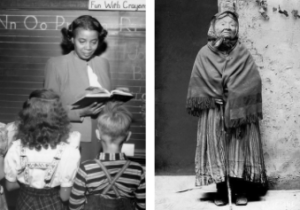Women’s History Month 2022: Celebrating Remarkable West Seattle Women
You don’t have to look too far in Seattle to find an impressive list of ambitious, intelligent and accomplished women. As we close off this Women’s History Month, we’d like to highlight the accomplishments and legacies of two remarkable women who changed West Seattle history.
Thelma Dewitty
Many excellent classroom teachers became pioneering groundbreakers in their time. This is true of Thelma Dewitty, a talented classroom teacher who became the first African American educator in Washington state’s Seattle Public School System.
Dewitty taught for 14 years in Corpus Christi, Texas prior to coming to Seattle. She began teaching in Seattle after an intervention on her behalf by the Seattle Urban League, the NAACP, The Civic Unity Committee and the Christian Friends for Racial Equality. In 1947, Thelma DeWitty was commissioned as a second grade teacher at the Frank B. Cooper School. Although the question of racial discrimination was a concern, Seattle graciously embraced the Texas native.
Besides working as a school teacher, she served as president of Seattle’s NAACP chapter and was on the board of Washington State Board Against Discrimination and the City Board of Theater Supervisors, and she is the namesake for Youngstown’s Thelma DeWitty Theater. The old Cooper School building, now Youngstown Cultural Arts Center, was made a historical landmark in part because of DeWitty’s association with the school.
It was Dewitty’s hiring that opened the door for Black educators in Seattle. These women not only broke the color barrier in education, but they also transformed the plight of education in Seattle, as they challenged the system and the community to accept the idea of the intellectual prowess and capabilities of African Americans.
Kikisoblu (Princess Angeline)
Also known Princess Angeline, Kikisoblu was a Duwamish Tribe member and the eldest daughter of Chief Sealth (from whom Seattle takes its name). As a member of the Duwamish Tribe, Princess Angeline was a prominent link between Indigenous peoples and settlers.
She is often remembered for her perceived fellowship with white settlers and her position as one of only a few Natives who did not leave the Seattle area for reservations after the Treaty of Point Elliott in 1855.
Instead of joining the exodus, Angeline refused to leave her Western Avenue home, a modest waterfront cabin in between Pike Street and Pine Street. She continued to be a recognizable figure on the streets of Seattle, wearing her shawl and her red handkerchief.
She remained long after white settlers claimed the city as their own—in a cabin near present-day Pike Place Market—a decades-long reminder to Seattleites of who was here first. Streets around the area are named after her, as is a shelter for the YWCA that provides support for women experiencing homelessness. She was the last direct descendant of Chief Seattle and is known for her kindness, acceptance and friendship with the early settlers who built up the city.
On Saturday, April 23, the Duwamish Longhouse is hosting a Kikisoblu Princess Angeline tea, featuring traditional Coast Salish tea, food and live Native flute music.

